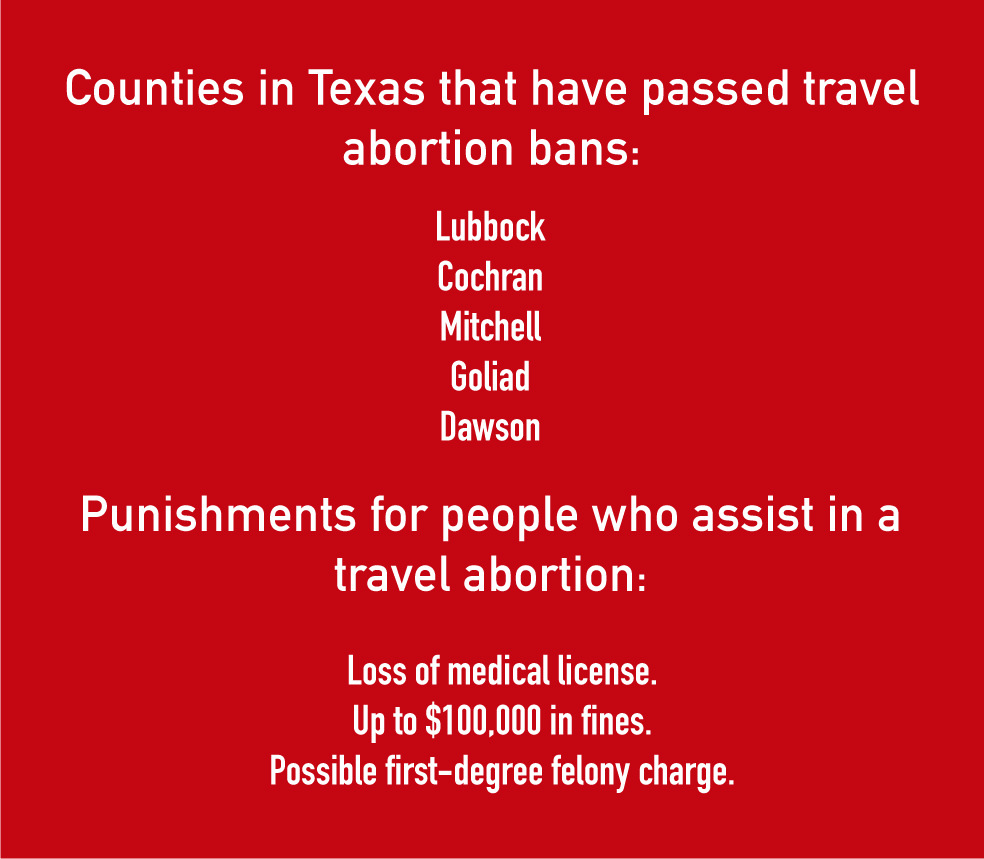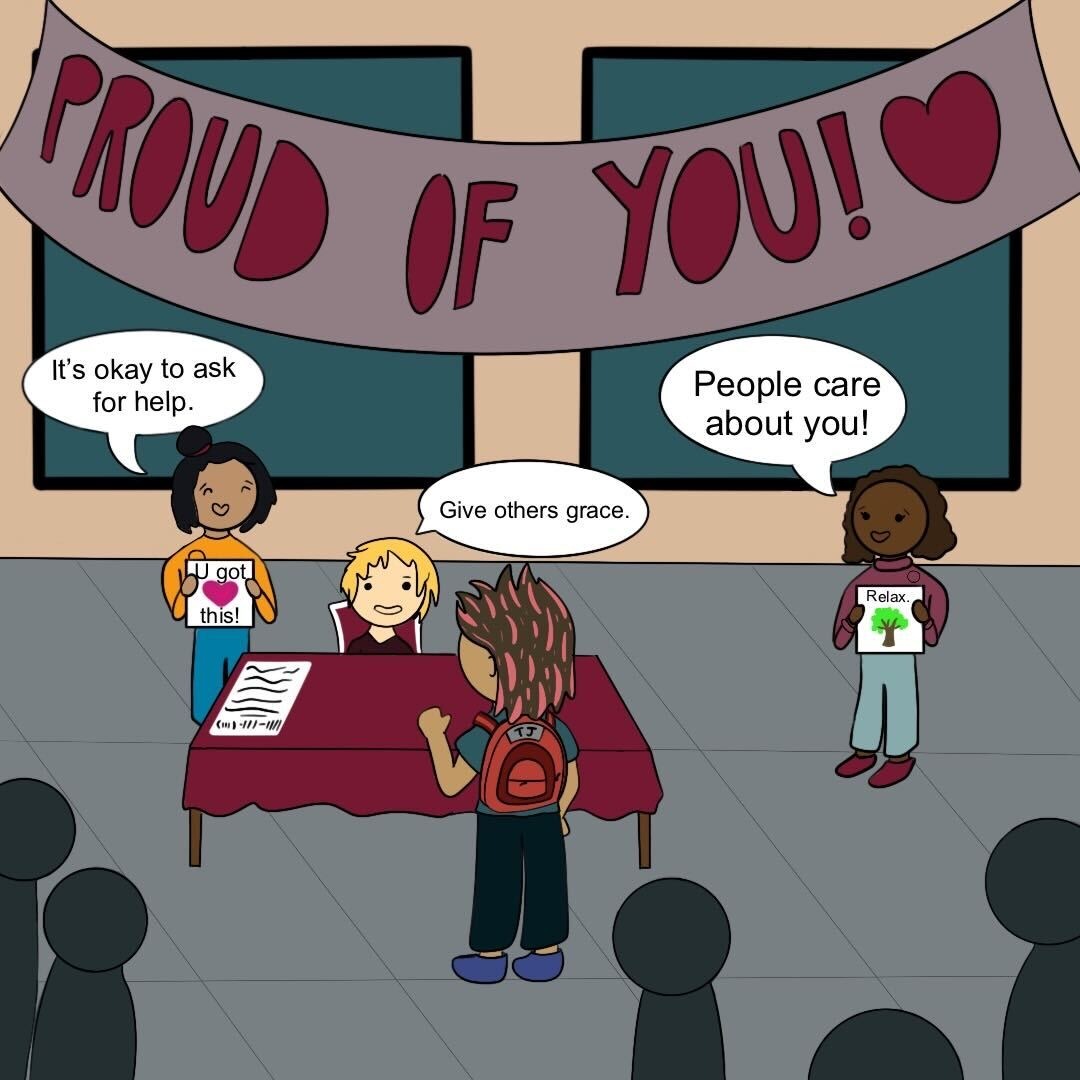Although Texas is already among the states with the strictest abortion laws, legislative attention given to the issue of abortion has not stopped. Many West Texas counties are drafting ordinances meant to punish those who aid women in traveling out of state to obtain a legal abortion.
Abortion travel bans are ordinances passed in order to further establish an anti-abortion initiative, despite Texas banning nearly all forms of abortion in August 2022 after Roe v. Wade was overturned.
The ordinances are drafted and passed by counties, aiming to prohibit Texans from seeking safe and legal abortions in another state by enforcing civil lawsuits against any person who assists another in obtaining an abortion out of state.
Abortion travel bans are controversial for many reasons aside from the removal of safe abortion options. The ineffective methods of enforcing abortion travel bans, along with the constitutional right for interstate travel, make these ordinances a frustrating symbol of the skewed priorities of local governments in Texas.
As of December 2023, five Texas counties successfully passed abortion travel bans, including Lubbock, Cochran, Mitchell, Goliad and Dawson. In addition, Amarillo is in the midst of drafting its own abortion travel ban. Other states working to establish abortion travel bans include Oklahoma, Tennessee and Idaho.
Abortion travel bans exist on a fine line. According to the U.S. Department of Justice, states cannot prohibit individuals from seeking an out-of-state abortion because the right to interstate travel is protected in the United States Constitution. Therefore, governments cannot explicitly target those seeking an abortion. To curb this, these ordinances aim to punish those who help someone else receive an abortion out of state.
Regulating interstate travel would violate constitutional rights, so abortion travel bans are enforced by private lawsuits instead of police. This means if someone aids a person seeking an abortion in traveling state lines, whether it be by driving, scheduling the appointment or assisting in any way, that individual can face a lawsuit.
Texas counties are scrambling – not to protect children born in Texas, but to induce fear in women.
According to data compiled by NPR, states with the strictest abortion bans also have the weakest infrastructure to support women who will be forced to carry to term.

The mothers in those states have the least financial aid and access to health care, leading to poor health outcomes.
Forced pregnancy without proper resources can lead to higher chances of infection, blood loss, obstructed labor and poor mental health. It can also cause individuals to resort to unsafe abortion options that, according to The National Library of Medicine, can result in hemorrhage, infection, sepsis and genital trauma. Texas does not make exceptions for lethal fetal abnormalities, leading to devastating emotional and physical trauma when a person is forced to give birth to a baby that will die upon labor.
The San Marcos and Texas State community feels the weight of abortion restrictions Texas continues to prioritize.
The San Marcos Abortion Activists, an organization advocating for San Marcos since the overturn of Roe v. Wade in 2022, is currently trying to get San Marcos to pass the Guarding the Right to Abortion Care for Everyone (G.R.A.C.E) Act, a resolution allowing city governments to de-prioritize the enforcement of abortion-related laws.
The G.R.A.C.E Act has already been passed in Austin, San Antonio and Dallas. San Marcos must follow suit in order to protect the community from abortion travel bans.
Instead of continuing to drill fear into Texans under the guise of “protecting life,” local and state governments need to use time and resources to better the future of children in Texas. One crucial step would be addressing the Texas foster care system which continues to rank among the lowest in the country.
Abortion travel bans are nothing but a statement of power and control. They cannot be enforced efficiently and they teeter on the edge of illegally regulating the right to interstate travel.
As students at Texas State, we must use our voting power and political rights to advocate for a future where Texas works toward protecting women and children and not taking away their rights. Getting involved with local activist groups such as The San Marcos Abortion Activists is a way we can make change on a local level.
-Faith Fabian is an English sophomore
The University Star welcomes Letters to the Editor from its readers. All submissions are reviewed and considered by the Editor in Chief and Opinions Editor for publication. Not all letters are guaranteed for publication.

















